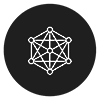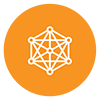The smart city ecosystem is huge and varied - trying to keep pace with new actors, devices, standards and protocols can be an unending task. Adding new data sources to your system, or even just updating existing sources, sometimes requires huge updates and breaking compatibility. The Eclipse sensiNact project provides a simple lightweight smart city platform hosting a digital twin of your city infrastructure, suitable for deployment at the edge or in the cloud. Eclipse sensiNact makes accessing data or triggering actions for any of your city’s smart capabilities consistent, simple and flexible, regardless of what native protocol or data format is used underneath. In addition, sensiNact provides push notifications, integrates with AI to automatically respond to data changes, and can deploy business logic to the edge for fast “reactions” even if the wider internet is unreachable.


